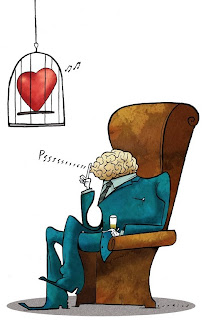Rolling Stones, 1969.)
Up, Down, Appendix.


 Near the beginning of Toronto's second summer (or third if you count last winter), on the occasion of the Enbridge AGM ... a march, beginning at David Pecaut Square (a name that Google Maps does not know) and going to the King Edward hotel, a few blocks east, where the so-called 1% were gathered to count their money.
Near the beginning of Toronto's second summer (or third if you count last winter), on the occasion of the Enbridge AGM ... a march, beginning at David Pecaut Square (a name that Google Maps does not know) and going to the King Edward hotel, a few blocks east, where the so-called 1% were gathered to count their money.The dynamic Exxon Valdez sculpture seemed an apt homage to Bill Reid. Pleasant and graciously smiling young women from Greenpeace went about distributing TTC tokens and apples, and later on when it turned rainy and cool - granola bars. The police were gracious too - proving once again that learning does go on, even in Toronto.



 Quite a few people from Aamjiwnaang were there including Ron Plain. What can you say to someone who lives in such a place? Whose home has been turned into a living hell? And not suddenly either - a creation executed with careful planning over well more than fifty years. A hundred years? Five hundred?
Quite a few people from Aamjiwnaang were there including Ron Plain. What can you say to someone who lives in such a place? Whose home has been turned into a living hell? And not suddenly either - a creation executed with careful planning over well more than fifty years. A hundred years? Five hundred?In fact the march did not start anywhere near Toronto but in Prince George (B.C.). The Globe tells me that the RCMP are now scurrying about after the Yinka Dene Alliance - so they must be doing something right. Even Clayton Thomas-Muller, whom I criticized over his loutish conduct during the panel discussion with Jim Hansen a year or so ago, is getting better, more effective - as his performance yesterday as MC of the march proved.
If the only leadership on these issues is coming from the First Nations - then I for one am WITH them.
So ...
I spoke to a few people I recognized, I remembered some of their names; some others I knew turned their backs on me, passed me by - just one person spoke to me, Mari, the poet from the Waglisla fast (see her here).
Paranoid creatures do still function according to 'rules' in a way. There are patterns - that is why the word exists at all, isn't it eh?
 In the end, and before Martin Louie, Na'Moks, and Jackie Thomas returned to the street from the meeting, my feet began to hurt.
In the end, and before Martin Louie, Na'Moks, and Jackie Thomas returned to the street from the meeting, my feet began to hurt.There was nowhere to sit down so I made my thankyous and hobbled away in the rain to catch the eastbound 504 car thinking of the word 'shibboleth'.
One of those christians could make a dandy sermon around this word - maybe someone has, but I have never heard of it - and maybe you will understand what I mean if you read this carefully. Echoes of Old Testament structures in the New Testament and all that ...
You will certainly not understand without knowing something of the word itself. You can see Wikipedia and an article by David Curwin for an overview.
It is not a word one employs every day. I was talking with a woman activist a few months ago and went out on a limb a bit to use it to refer to bourgeois reactions to 'despair', that ubiquitous psychology which must never be acknowledged - a taboo.
Later on I wondered if I had spoken correctly - and the OED kept me wondering until the very last entry, (a quick precis):
1. The Hebrew word used by Jephthah as a test-word by which to distinguish the fleeing Ephraimites (who could not pronounce the sh) from his own men the Gileadites (Judges xii. 4–6).
2. A word or sound which a person is unable to pronounce correctly; a word used as a test for detecting foreigners, or persons from another district, by their pronunciation.
3. A peculiarity of pronunciation or accent indicative of a person's origin.
4. A custom, habit, mode of dress, or the like, which distinguishes a particular class or set of persons.
5. A catchword or formula adopted by a party or sect, by which their adherents or followers may be discerned, or those not their followers may be excluded.
6. The mode of speech distinctive of a profession, class, etc.
[and finally ... Whew!]
7. Additions 1993: A moral formula held tenaciously and unreflectingly, especially a prohibitive one; a taboo.
Being a Hebrew word, it occurs here and there in biblical text; in verse 2 of Psalm 69 for example, where it means the 'flowing current of a stream':
"I sink in deep mire, where there is no standing: I am come into deep waters, where the floods overflow me."and elsewhere where it can mean a corn cob or 'the kernel of the seed'. 'The force that through the green fuze drives the flower' as it were.
In Judges 12 it is used as a verbal image, indirectly, even metaphorically - an apt use given its connection with rivers:
"And the Gileadites took the passages of Jordan before the Ephraimites: and it was so, that when those Ephraimites which were escaped said, Let me go over; that the men of Gilead said unto him, art thou an Ephraimite? If he said, Nay then said they unto him, Say now Shibboleth: and he said Sibboleth: for he could not frame to pronounce it right. Then they took him, and slew him."A means then to identify and sort out the elect from the praeterite as they try to cross the Jordan.
A republican (gun toting) Texan fix-yourself guru, Brené Brown, makes an interesting distinction between shame and guilt: shame is focussed on the self - "I am bad"; and guilt is focussed on behaviour - "I did something bad".
At least a shibboleth removes some measure of responsibility from the sinner; since the way one's tongue forms 's' or 'sh' is hardly a matter of choice, more like DNA - something which can be determined scientifically and in advance.
Be well gentle reader.
Appendix:
1. Game Over for the Climate, James Hansen, May 9 2012.
Game Over for the Climate, James Hansen, May 9 2012.
GLOBAL warming isn’t a prediction. It is happening. That is why I was so troubled to read a recent interview with President Obama in Rolling Stone in which he said that Canada would exploit the oil in its vast tar sands reserves “regardless of what we do.”
If Canada proceeds, and we do nothing, it will be game over for the climate.
Canada’s tar sands, deposits of sand saturated with bitumen, contain twice the amount of carbon dioxide emitted by global oil use in our entire history. If we were to fully exploit this new oil source, and continue to burn our conventional oil, gas and coal supplies, concentrations of carbon dioxide in the atmosphere eventually would reach levels higher than in the Pliocene era, more than 2.5 million years ago, when sea level was at least 50 feet higher than it is now. That level of heat-trapping gases would assure that the disintegration of the ice sheets would accelerate out of control. Sea levels would rise and destroy coastal cities. Global temperatures would become intolerable. Twenty to 50 percent of the planet’s species would be driven to extinction. Civilization would be at risk.
That is the long-term outlook. But near-term, things will be bad enough. Over the next several decades, the Western United States and the semi-arid region from North Dakota to Texas will develop semi-permanent drought, with rain, when it does come, occurring in extreme events with heavy flooding. Economic losses would be incalculable. More and more of the Midwest would be a dust bowl. California’s Central Valley could no longer be irrigated. Food prices would rise to unprecedented levels.
If this sounds apocalyptic, it is. This is why we need to reduce emissions dramatically. President Obama has the power not only to deny tar sands oil additional access to Gulf Coast refining, which Canada desires in part for export markets, but also to encourage economic incentives to leave tar sands and other dirty fuels in the ground.
The global warming signal is now louder than the noise of random weather, as I predicted would happen by now in the journal Science in 1981. Extremely hot summers have increased noticeably. We can say with high confidence that the recent heat waves in Texas and Russia, and the one in Europe in 2003, which killed tens of thousands, were not natural events — they were caused by human-induced climate change.
We have known since the 1800s that carbon dioxide traps heat in the atmosphere. The right amount keeps the climate conducive to human life. But add too much, as we are doing now, and temperatures will inevitably rise too high. This is not the result of natural variability, as some argue. The earth is currently in the part of its long-term orbit cycle where temperatures would normally be cooling. But they are rising — and it’s because we are forcing them higher with fossil fuel emissions.
The concentration of carbon dioxide in the atmosphere has risen from 280 parts per million to 393 p.p.m. over the last 150 years. The tar sands contain enough carbon — 240 gigatons — to add 120 p.p.m. Tar shale, a close cousin of tar sands found mainly in the United States, contains at least an additional 300 gigatons of carbon. If we turn to these dirtiest of fuels, instead of finding ways to phase out our addiction to fossil fuels, there is no hope of keeping carbon concentrations below 500 p.p.m. — a level that would, as earth’s history shows, leave our children a climate system that is out of their control.
We need to start reducing emissions significantly, not create new ways to increase them. We should impose a gradually rising carbon fee, collected from fossil fuel companies, then distribute 100 percent of the collections to all Americans on a per-capita basis every month. The government would not get a penny. This market-based approach would stimulate innovation, jobs and economic growth, avoid enlarging government or having it pick winners or losers. Most Americans, except the heaviest energy users, would get more back than they paid in increased prices. Not only that, the reduction in oil use resulting from the carbon price would be nearly six times as great as the oil supply from the proposed pipeline from Canada, rendering the pipeline superfluous, according to economic models driven by a slowly rising carbon price.
But instead of placing a rising fee on carbon emissions to make fossil fuels pay their true costs, leveling the energy playing field, the world’s governments are forcing the public to subsidize fossil fuels with hundreds of billions of dollars per year. This encourages a frantic stampede to extract every fossil fuel through mountaintop removal, longwall mining, hydraulic fracturing, tar sands and tar shale extraction, and deep ocean and Arctic drilling.
President Obama speaks of a “planet in peril,” but he does not provide the leadership needed to change the world’s course. Our leaders must speak candidly to the public — which yearns for open, honest discussion — explaining that our continued technological leadership and economic well-being demand a reasoned change of our energy course. History has shown that the American public can rise to the challenge, but leadership is essential.
The science of the situation is clear — it’s time for the politics to follow. This is a plan that can unify conservatives and liberals, environmentalists and business. Every major national science academy in the world has reported that global warming is real, caused mostly by humans, and requires urgent action. The cost of acting goes far higher the longer we wait — we can’t wait any longer to avoid the worst and be judged immoral by coming generations.
Down.









 I met an old fellow named Jim at a seed exchange. He was giving his seeds away instead of selling them. We had a brief chat. He wasn't thinking of the Song of Solomon and didn't want to, but he gave me a smile and a recycled envelope with a few Rose of Sharon seeds in it.
I met an old fellow named Jim at a seed exchange. He was giving his seeds away instead of selling them. We had a brief chat. He wasn't thinking of the Song of Solomon and didn't want to, but he gave me a smile and a recycled envelope with a few Rose of Sharon seeds in it.



 Read the
Read the 





























 I'm not, literally, actually, a sumac (yet) and I hardly notice.
I'm not, literally, actually, a sumac (yet) and I hardly notice.


